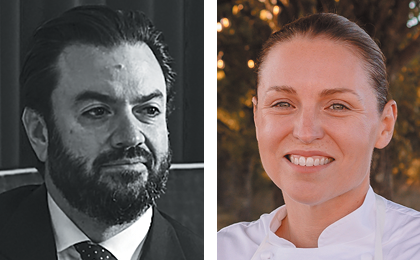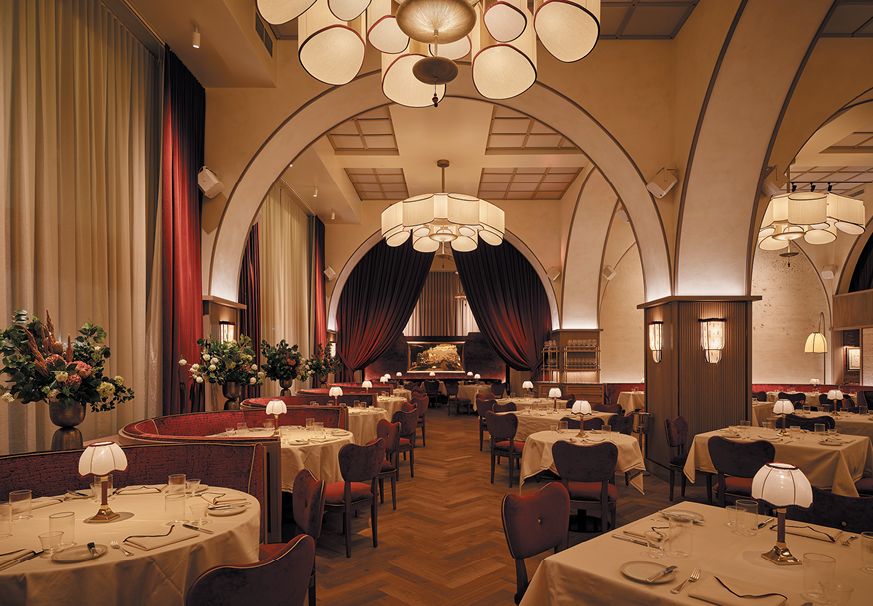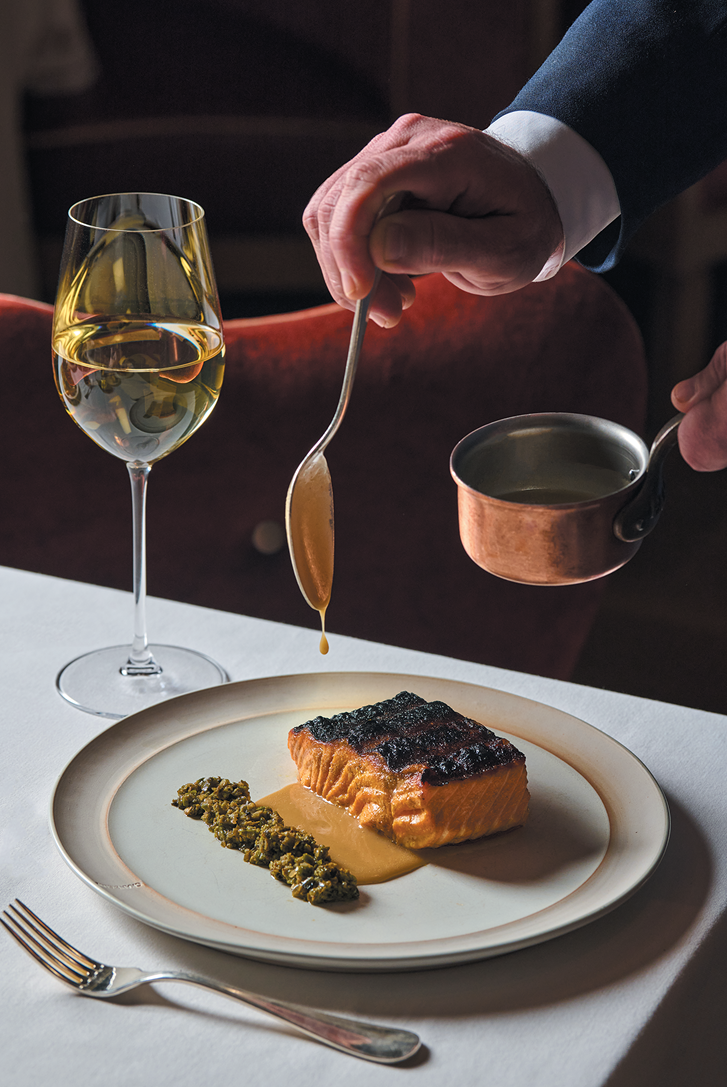- Home
- Media Kit
- MediaJet
- Current Issue
- Past Issues
- Ad Specs-Submission
- Reprints (PDF)
- Photo Specifications (PDF)
- Contact Us
- PRIVACY POLICY
- TERMS OF USE
![]()
ONLINE
![]()
ONLINE


Jeffrey Katz and Melissa Rodriguez
The Crane Club Experience
Editors’ Note
Jeffrey Katz is the Managing Partner of (Crane Club) in New York City. Prior to this, he was a partner at several revered New York City restaurants, including Crown Shy, SAGA, Al Coro, Overstory and Mel’s. Katz’s NYC career began at Del Posto, where he was General Manager for over a decade, and later was made Managing Partner. He earned a BA degree in marketing and entrepreneurship from Babson College.
Crane Club is helmed by Chef Melissa Rodriguez, who received two Michelin stars at Al Coro where she was partner and executive chef. After graduating from the Culinary Institute of America at Hyde Park, Rodriguez started her professional culinary career with Elaine Bell Catering and at Oceana. In 2006, she was hired as a line cook at Daniel Boulud’s flagship restaurant, Daniel, where she quickly rose the ranks to sous chef. After five years at Daniel, Rodriguez joined the team at Del Posto where she was soon promoted to Chef de Cuisine. Two years later, she was named Executive Chef.
Will you discuss your career journeys?
Katz: I started working at 15 as a dishwasher and fry cook – not the best combo, frying and washing dishes at the same time – so I didn’t stay there long. I moved on to a small, upscale Italian restaurant in my hometown and worked there through part of college. Halfway through college, I joined a Tuscan restaurant and eventually partnered with the chef to open a new place, where I served as the wine director. After graduating from Babson College – initially with no intention of staying in hospitality – I moved to New York City. About a month after Del Posto opened, I joined the team as a manager. Three years later, I became the General Manager, and we eventually earned four stars from The New York Times. In 2017, James Kent approached me to partner on opening Crown Shy, SAGA, and Overstory. We launched those while I was still overseeing Del Posto. When the pandemic permanently closed Del Posto, Melissa, an investor, and I took over the space and opened Mel’s, Discolo, and Al Coro. Al Coro earned two Michelin stars just three months in, but ultimately those concepts didn’t sustain long-term. We closed them and partnered with Tao Group to open Crane Club.
Rodriguez: If you had asked me 25 years ago if I would be where I am now, I would have been very hesitant to say that I would still be working in the industry. But truthfully, I am stubborn, and I have always worked really hard to not fail. It’s just something I stuck with. I graduated from cooking school and spent a few years in Sonoma, California. When I returned back to New York City, I really just wanted to be challenged and take my path seriously. I found myself working in a few very fancy restaurants. I became a sous chef at Daniel and after five years or so I decided to move on. I began what became a long stint at our current space. I was hired at Del Posto where after a few years I was promoted to Executive Chef. During my time at Del Posto, I received a Michelin star and three New York Times stars. Del Posto closed during COVID. Jeff and I then took over the space and opened Mel’s, Al Coro and Discolo. We received two Michelin stars very quickly but that just wasn’t enough to make it, and we shuttered. We are now partnered with the Tao Group and have opened Crane Club.

Crane Club located in West Chelsea
When did you know you wanted to pursue a career as a chef?
Rodriguez: I started cooking young. I was a picky eater, and my mom – who worked a lot – would leave food for my sister and me to reheat. I didn’t love reheated food, so I started cooking for myself. She saw that interest and encouraged me to attend a summer program at the Culinary Institute of America (CIA) when I was 15. Afterward, I got a job at a local restaurant and worked toward enrolling at the CIA full-time after high school. Before culinary school, I wasn’t sure if being a chef was something I could actually do well – I thought maybe I’d end up in nutrition. But once I was in a real kitchen, I realized I loved it. I didn’t start out knowing I’d become a chef – it evolved over time.
What has made the hospitality industry so special for you?
Katz: Honestly, I’ve been lucky to work with people I genuinely enjoy. It often feels more like being on a great team than a job. People in hospitality tend to develop strong interpersonal skills – basic things that make you a better human: saying please and thank you, greeting others before asking for something, holding doors, picking up things that aren’t yours. I love the pursuit of “the best,” “the warmest,” “the most thoughtful” experience. What one guest finds amazing, another might not – so the challenge is tailoring that for each person. That puzzle keeps it exciting.
What was the vision for launching Crane Club?
Katz: The idea was to strike a balance between the kind of high-level restaurants Melissa and I have created and the energy-driven, experience-focused concepts Tao is known for. We asked ourselves: Can we maintain exceptional food and service while infusing the energy and vibrancy that people have grown to expect from the Tao team? I think we’ve done just that, and the response so far has been really encouraging.

One of Chef Rodriqez’s signature dishes at Crane Club
How do you describe the Crane Club experience?
Katz: It’s whatever you need it to be: Business dinner? We’ve got you. Friends visiting from out of town? Perfect. Date night, celebration, or just a bite at the bar – it all fits. We can dial up the wine service, tailor your dinner’s pace, or just serve great cocktails. It’s meant to be flexible but still elevated. Some people come seeking first rate cocktails, others the cuisine, and the wine people come for the list – some come with all these expectations, all in a room that is bustling and exciting.
How have you approached the menu offerings for Crane Club?
Rodriguez: The heart of the menu is our wood-fired grill – nearly everything touches it at some stage. We focus on seasonal ingredients, open-fire cooking, and dishes meant to be shared. It’s about creating food that feels both comforting and exciting.
Will you discuss working with the Tao Group and the value this partnership has created?
Katz: We’ve managed to create that rare synergy where 1 + 1 = 3. Each side of the partnership has brought something unique to the table, and by putting those talents together, we’ve built something that otherwise we wouldn’t have been able to. Everyone knows their strengths, and we respect each other’s expertise. And this project required that we all step out of our comfort zones, but that’s where the magic seems to come from. It’s not always easy to get there, but the formula seems to be working so far.
What advice do you offer to young people hoping to pursue a career as a chef?
Rodriguez: It’s a career built on hard work, dedication, and sacrifice. If having a “regular” work week is important to you, this might not be the right path. For me, it’s been crucial to stay curious and open to learning. A mentor once told me, “Keep your hands busy and your eyes and ears open.” That stuck with me. Being a chef is also about leadership and teamwork. It’s not just about making food look and taste great – it’s about mentoring, managing, and creating a space where others can thrive.
What do you tell young people about careers in hospitality?
Katz: I tell young people that hospitality is one of the most rewarding industries out there – if you’re passionate, resilient, and people-focused. It teaches you discipline, creativity, empathy, and how to lead under pressure. It’s not always an easy lifestyle, but if you’re driven by service and the joy of creating memorable experiences, the opportunities are endless. It’s a career where hard work truly opens doors – from dishwasher to owner, I’ve lived it. The other night an old employee of mine from over a decade ago approached me while I was dining in a new restaurant in Manhattan. When I met her so many years back, she was a porter in the restaurant, and now she is a captain in a new big swanky New York City restaurant. Back when she worked with me, she was just getting started, and she thanked me for all those years ago and helping her on her path. The more years I do this work, the more moments like that really can make it worthwhile. We spend so much time focusing on what needs to be better, unhappy customers, or unhappy employees. So, when someone learns and develops a career, it’s really special. Hospitality is one of the last apprentice style career paths. Anyone can do the work if they want to try and learn from their peers. You can come from all walks of life, you don’t need any specific schooling, and if you care, you can do it.
What has made the working relationship between the two of you work so well?
Katz: Time is the greatest teacher – and we’ve worked together for a long time. It’s kind of like a marriage, except we go home to different places. We balance each other out. You’ll rarely find us both in a bad mood at the same time – we take turns, and we’re good at pulling each other out of the mud when needed. When the going gets tough, which inevitably it does, we’re there for each other. I couldn’t see it any other way. I’ll also say around us are many people who have been with us through most of our careers, and that is a unique and special place to be.![]()